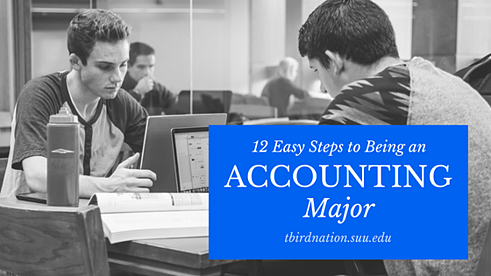How to be an Accounting Major in 12 Steps
Posted: October 25, 2016 | Author: Cami Mathews | Read Time: 4 minutes

Southern Utah University offers an AACSB-accredited accounting bachelor’s degree program. Nearly 100 percent of the school’s accounting graduates are employed right after graduation, with many landing a job before they have officially graduated. Accounting has proven to be a needed field of study in the world, giving students a stable career opportunity.
Students who are in SUU's accounting bachelor's degree program have the chance to gain real-world experience while assisting people with their taxes in the spring. They also have chances to intern with local businesses or large accounting firms, giving them a taste of accounting practices in the real-world.
Not only do students have an opportunity to obtain a bachelor's degree in accounting, they can also continue their education and receive a Masters of Accountancy (MAcc). The graduate program provides greater insights to further develop the knowledge and skills to enter professional accountancy. With nearly a 100 percent placement rate, most MAcc graduates are employed by accounting firms or government agencies in Utah, Nevada, and California.
Professors in the accounting program are top of the line, each having experience as an accountant or in business law. Each professor also has valuable connections in the accounting field, which helps place graduates into jobs that they may have not been able to find on their own.
If a student is looking for a challenging, secure career, then they should look into the possibilities available through the Southern Utah University accounting bachelor’s degree program.
Sara Fallentine, a senior accounting major from Wellsville, Utah, helps potential students figure out if pursuing accounting is right for them.
Accounting Major Slideshare from suutbirds
Here are 12 easy steps to being an accounting major.
1. Study daily. Students should expect to spend around two hours a night studying, sometimes more if the class is challenging for them. Don't procrastinate because it's really easy to get behind.
2. Develop critical thinking skills. Most of the homework includes critical thinking problems. Typically there are not any essays or research projects assigned.
3. Take in-person classes. Having a professor readily available in-class to answer questions is extremely helpful. There are a lot of steps with every accounting problem (especially in Intermediate Accounting). I personally think taking classes online would be confusing and hard to follow.
4. Have a balanced schedule. Accounting is challenging so a good rule of thumb is for students to take 1-2 hard classes, 2-3 intermediate classes, and 1 easy class each semester. This helps students not to get too overwhelmed.
5. Take your entry level math and intro to accounting first. Do not make the mistake of taking these classes later in your college career because it may prevent upper-level classes from being taken until they are completed.
6. Don't take Business Law and Intermediate Accounting at the same time. These classes require a lot of time and have a heavy course load. I suggest splitting these classes between different semesters so you don't overwhelm yourself with work.
7. Take the tax classes during the spring semester. It would be wise for students to take their tax class in the spring so that they can receive hands-on experience with the Volunteer Income Tax Assistance (VITA) program. SUU students help community members with their taxes, free of charge, saving the community money and giving the students real-world experience.
8. Be good at time management. An accounting major is a difficult major and requires a lot of work and discipline. However, with good time management it is possible to have free time for getting involved in school clubs, activities and friends.
9. Sign-up for the School of Business emails. There are plenty of accounting related jobs on campus or in Cedar City. The School of Business sends out emails periodically with jobs that are available specifically for accounting majors. Utilize the information on those emails to find opportunities that are available.
10. Join the Professional Accountancy Club. The Professional Accountancy Club (PAC) is a must for accounting majors. The club takes students on trips to visit accounting firms, teaches students how to make their resumes better, and brings in speakers who have worked in a variety of accounting fields.
11. Make sure you have an internship. Employers look for accounting experience from outside of the classroom on a student’s resume. Work with your professor to secure an internship before you graduate.
12. School gets easier. The more you study and learn about accounting, the easier it gets. Calculating the sustainability growth rate or sorting through debits and credits may seem daunting now, but near the end of your accounting degree you will be laughing at jokes like ‘Welcome to the accounting department, where everyone counts’ or ‘It’s accrual world’.
This article was published more than 3 years ago and might contain outdated information or broken links. As a result, its accuracy cannot be guaranteed.
Tags: School of Business Majors




